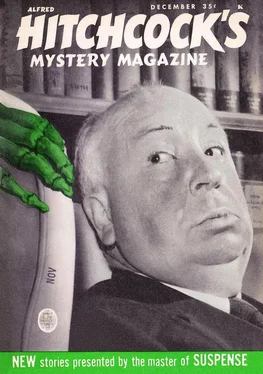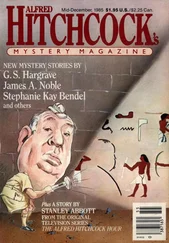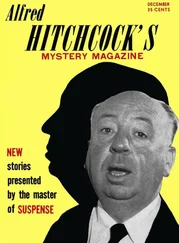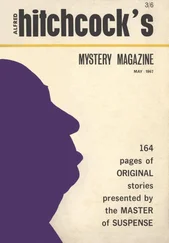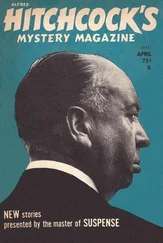Lisa Belknap - Alfred Hitchcock’s Mystery Magazine. Vol. 6, No. 12, December 1961
Здесь есть возможность читать онлайн «Lisa Belknap - Alfred Hitchcock’s Mystery Magazine. Vol. 6, No. 12, December 1961» весь текст электронной книги совершенно бесплатно (целиком полную версию без сокращений). В некоторых случаях можно слушать аудио, скачать через торрент в формате fb2 и присутствует краткое содержание. Город: Concord, Год выпуска: 1961, Издательство: H.S.D. Publications, Жанр: Детектив, на английском языке. Описание произведения, (предисловие) а так же отзывы посетителей доступны на портале библиотеки ЛибКат.
- Название:Alfred Hitchcock’s Mystery Magazine. Vol. 6, No. 12, December 1961
- Автор:
- Издательство:H.S.D. Publications
- Жанр:
- Год:1961
- Город:Concord
- ISBN:нет данных
- Рейтинг книги:3 / 5. Голосов: 1
-
Избранное:Добавить в избранное
- Отзывы:
-
Ваша оценка:
- 60
- 1
- 2
- 3
- 4
- 5
Alfred Hitchcock’s Mystery Magazine. Vol. 6, No. 12, December 1961: краткое содержание, описание и аннотация
Предлагаем к чтению аннотацию, описание, краткое содержание или предисловие (зависит от того, что написал сам автор книги «Alfred Hitchcock’s Mystery Magazine. Vol. 6, No. 12, December 1961»). Если вы не нашли необходимую информацию о книге — напишите в комментариях, мы постараемся отыскать её.
Alfred Hitchcock’s Mystery Magazine. Vol. 6, No. 12, December 1961 — читать онлайн бесплатно полную книгу (весь текст) целиком
Ниже представлен текст книги, разбитый по страницам. Система сохранения места последней прочитанной страницы, позволяет с удобством читать онлайн бесплатно книгу «Alfred Hitchcock’s Mystery Magazine. Vol. 6, No. 12, December 1961», без необходимости каждый раз заново искать на чём Вы остановились. Поставьте закладку, и сможете в любой момент перейти на страницу, на которой закончили чтение.
Интервал:
Закладка:
But look what happened.
Clancy’s Machine and Tool Works said no overtime one evening, so Tony got home earlier than usual. When he opened the door of his Brooklyn apartment, he heard a sound he couldn’t believe.
It was a sound like an angel had busted loose all over the place.
He closed the door quietly behind him and listened.
It was a sound that was like pure crystal. It was a sound that when you heard it you didn’t need nothing, just that sound. It had it all. It made you understand. It gave you joy, it gave you sadness. It put you into a dream. It peeled away the world. It was a sound that once heard you had to keep hearing. It was a sound that was singing.
Tony walked through the apartment and in the bedroom was his wife, Agnes, and she was making the sound.
When Tony came in she shut up quick.
“Aggie, I didn’t know you could sing like that,” Tony said.
“Oh, that was nothin’,” Aggie said.
“Nothin’? Whaddaya mean nothin’?”
“Nothin’.”
“Don’t give me that,” Tony said, “I listen to opera. We got hi-fi. Radio. Television. I go to the movies. I never heard nothin’ that good. Let’s hear some more.”
“No.”
“Whaddaya mean, no?”
“I don’t sing for nobody.”
“Well, I’m your husband, ain’t I? You’ll sing for me.”
“No”
Tony looked at Aggie. He’d known her ten years. He realized that in all that time he’d never heard her sing. Not once. How come she’d been holding out on him? Here was a thing he never knew about Aggie. Maybe there were other things he didn’t know about Aggie. He’d thought they were, like they said, one. Maybe Aggie didn’t figure it that way. A pain twisted inside Tony.
“O.K.,” Tony yelled. “Don’t sing. Who needs your stupid singing? Who needs it?”
Tony went into the bathroom and took off his shirt and undershirt and began to wash. His hands were shaking, he was that bothered. He wanted to hear that singing again. And Aggie wouldn’t do that little thing for him.
Tony went out to get a fresh undershirt and there was Aggie, her eyes soft and sorry. She put her arms around Tony. Tony was hairy. He had hair all over his arms and chest and belly and shoulders. He was big and barrel chested. Aggie liked all this. She said he was a real man. Aggie put her arms around him and ran her fingers through the hair on his back and said, “Tony, don’t be mad.”
“Who’s mad?” Tony yelled.
“Please don’t be mad. I can’t ever sing for you or nobody else. Don’t ask me. But don’t be mad at me.”
“Why can’t you?”
“I can’t.”
“You mean you just sing to yourself?”
“Don’t ask me.”
“O.K.,” grumbled Tony. We’ll see, he thought.
A new thing had moved into his head. That sound. Even at work he kept hearing his wife’s singing. Low and haunting. A thing that ought to be heard again. A pure thing that should be his like Aggie should be his. That meant peace and delight. Why should Aggie hold out on him?
He asked her again, several times, figuring he might get her in the right mood. She wouldn’t sing.
One night, Tony took her out, dinner, a show, three different night spots. When they got home they were plastered, but Tony didn’t forget what he was after. He opened a bottle and gave Aggie another drink. He put her next to him on the sofa and began singing Home on the Range. He sang the whole thing himself. Aggie didn’t sing a note. He sang three more cowboy songs, coaxing Aggie to join in, but she wouldn’t. Tony gave her another drink and sang La Donna E Mobile, and that didn’t do any good. Tony sang O Sole Mio. He sang Smoke Gets In Your Eyes. Aggie went teary and sentimental and he said, come on, come on, but she wouldn’t sing. Then Tony started on Annie Laurie and somebody yelled out the window, “Cut out that racket you lousy drunks and let a guy get some sleep around here damn it,” so Tony said, “the hell with it” and fell on the rug and began to snore and Aggie fell on top of him.
Another time, there was a party and the bunch was around the piano, singing, and Tony yelled, “Quiet! You want to hear singing that is singing, listen to the wife. Tell the man what to play, honey.”
“Tony, how could you,” Aggie said and got her coat and started homeland he had to chase after her like an idiot.
But Tony didn’t give up. He needed to hear that angel sound like he needed his right arm.
There was a guy in the shop, had a smart head. Tony told him about the whole thing, and the guy said, The trouble is obviously Mental.
“Mental, huh?” said Tony.
“Obviously,” the guy said. “Obviously, she got a Block.”
“A Block, huh?”
“Obviously. Somepin’ must have happen to her, give her this Block about singing in front of people.”
“So what do I do?”
“Take her to a head shrinker.”
“A head shrinker. Hey, you trying to tell me the wife is crazy?”
“Who said that? All I’m saying is that she’s got this one Block. One stinkin’ Block don’t mean she’s crazy.”
“Well, O.K.,” Tony said.
Tony made an appointment with a head shrinker. The evening of the appointment he put on his hat and coat and said, “Come on, Aggie, we’re going out.”
“O.K.,” Aggie said, jumping up. “Where we going?”
“We’re going to see a head shrinker and don’t give me no trouble about it.”
“What for?” said Aggie, backing away.
“To get rid of this Block you got about singing.”
“Oh, so that’s it. You go if you want to. I’m staying.”
“Now don’t you want to be helped, Aggie?”
“I don’t want no help. I don’t want to be bothered about this no more. Leave me alone, will you?”
So they had a fight, and Tony slapped Aggie down, and then he was sorry, and they finally made it up, but Aggie didn’t get to see the head shrinker.
Tony went over to Bensonhurst to see Aggie’s brother, Phil, who lived there in an apartment with a wife and three kids.
“Sure,” Phil said, “I heard her sing.”
“Why won’t she sing for me?”
“She stopped singing when she was about sixteen.”
“Why?”
“She never told me. But it was after Pop died.”
“You think that had somepin’ to do with it?”
“I think so. Mom thinks so. Why don’t you go see her?”
Tony didn’t like Aggie’s Mom. Aggie’s Mom didn’t like Tony. But he went to see her in her Bronx apartment.
“She was very attached to her Daddy,” Aggie’s Mom said. “When she sang, it was for him. When he died, she wouldn’t sing for nobody else, not even me.”
“That don’t make sense,” Tony said. “What good did that do?”
“I don’t know. She wouldn’t talk about it.”
“Well, I’m her husband. She’ll sing for me.”
“Don’t make me laugh. She wouldn’t sing for her own Ma, why would she sing for a bum like you?”
Tony went home and said to Aggie, “So you stopped singing on account of your Daddy dying.” Aggie looked at Tony and said, “So you found out.”
“You still mourning or somepin’?” Tony asked.
“No, I ain’t still mourning.”
“So why don’t you sing?”
“I only sang for my Daddy.”
“Can’t you sing for your husband?”
“No.”
“Ain’t a husband as good as a Daddy?”
“A husband is different than a Daddy.”
“Well, some ways, ain’t a husband better than a Daddy?”
“Some ways, maybe. But some ways a Daddy is better.”
“What ways?” Tony yelled. “What ways is a Daddy better?”
“Never mind.”
“I had a Daddy too,” Tony yelled. “You think I never had no Daddy? I didn’t develop no Block when my Daddy died.”
Читать дальшеИнтервал:
Закладка:
Похожие книги на «Alfred Hitchcock’s Mystery Magazine. Vol. 6, No. 12, December 1961»
Представляем Вашему вниманию похожие книги на «Alfred Hitchcock’s Mystery Magazine. Vol. 6, No. 12, December 1961» списком для выбора. Мы отобрали схожую по названию и смыслу литературу в надежде предоставить читателям больше вариантов отыскать новые, интересные, ещё непрочитанные произведения.
Обсуждение, отзывы о книге «Alfred Hitchcock’s Mystery Magazine. Vol. 6, No. 12, December 1961» и просто собственные мнения читателей. Оставьте ваши комментарии, напишите, что Вы думаете о произведении, его смысле или главных героях. Укажите что конкретно понравилось, а что нет, и почему Вы так считаете.
